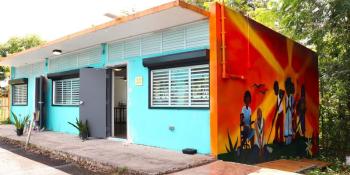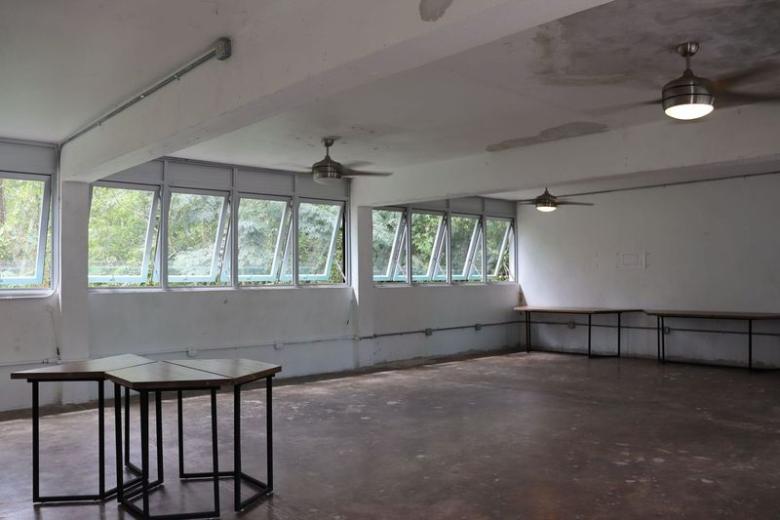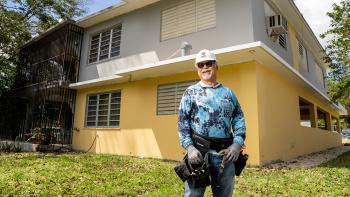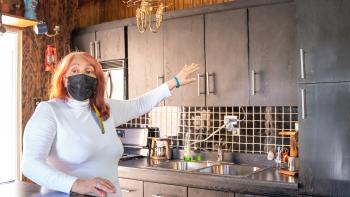
Good energy: A community builds resiliency with solar power in Puerto Rico
A solar-powered energy hub provides a safe place for families to charge their electrical devices and store medicine during weather-related emergencies in Puerto Rico. The energy hub is located at Parceleras Afrocaribeñas para Transformación Barrial’s La Conde, a community-centered space that serves Saint Just, San Antón and Los Mirtos.
Led by an intergenerational group of local Afro-Caribbean women, Parceleras Afrocaribeñas provides cultural, recreational, artistic and business opportunities that support equity and social justice for local Black communities. It is one of five organizations that participated in Habitat for Humanity’s capacity building program, designed to help community-based organizations in Puerto Rico increase their ability to help mitigate weather-related risks and minimize vulnerabilities in their communities.
Working together to create good energy
After hurricanes Irma and Maria caused widespread devastation across Puerto Rico in 2017, AbbVie became Habitat’s leading partner in reconstruction efforts on the island, committing US$50 million to Habitat to help families recover and rebuild. As part of that support, the capacity building program was generously funded by the research-based pharmaceutical company.
Habitat Puerto Rico CEO Amanda Silva says that working with local organizations like Parceleras Afrocaribeñas that have the “knowledge and the respect of their communities” has been integral to the development of unique solutions that help even more families build resiliency against future weather-related disasters.
“Community-based organizations are able to identify vulnerabilities and achieve concrete results and address their community’s particular needs,” Amanda says.
Habitat’s holistic hurricane recovery program has also supported home repairs and new construction, securing land tenure, long-term improvement to shelter and land resilience issues, and workforce development programming on the island.
An action plan for resiliency
“Participating in the capacity building program was an opportunity to think more deeply about how our organization can best respond to community needs in a sustainable way, especially during weather emergencies like hurricanes,” says Mapenzi Chibale Nonó, co-founder of Parceleras Afrocaribeñas para Transformación Barrial.
Habitat’s capacity building program adapts PASSA, a community participatory model developed by the Red Cross, for use in Puerto Rico via a web-based toolkit, Construir en Communidad. Utilized by community organizations to develop risk-reduction projects, the toolkit includes explanatory videos and techniques for effective community meetings and activities, guides to increase the safety of homes against natural hazards, and more.
With the toolkit as a guide, Parceleras Afrocaribeñas developed the action plan for the energy hub in response to power outages affecting the local community. Power outages during storms have become a common occurrence for residents in Puerto Rico, especially after Hurricane Maria.
“In moments of energetic collapse, many people in our community didn’t have anywhere to go to charge their devices and equipment to alleviate the stress that not having electricity obviously causes,” says Mapenzi.

During storms, local families can shelter safely inside the energy hub to charge their electrical devices and store medicine.
A safe place to shelter
Parceleras Afrocaribeñas received a US$20,000 grant from Habitat to help make their plan for the energy hub a reality. The solar-powered hub includes safety windows and doors that help it function as a shelter during storms, and it will include a refrigerator to store medicine.
“Because of its security windows and doors, storm shutters, solar energy and elevation, it is an important safe space in our community in response to hurricane season,” Mapenzi says.

